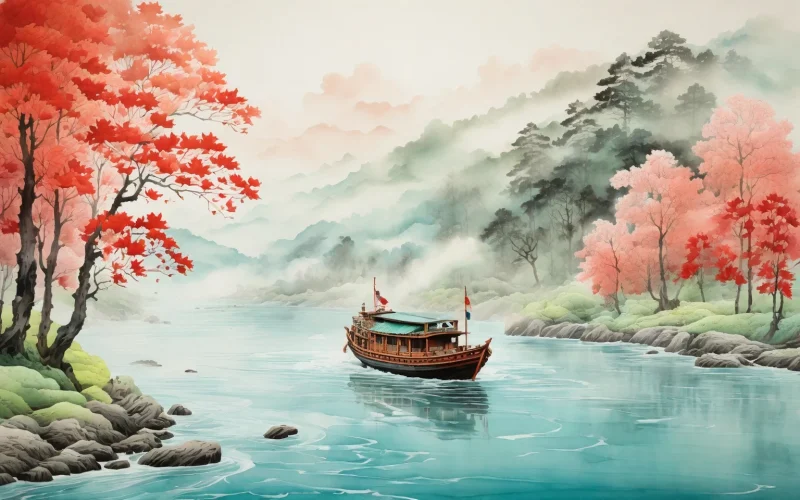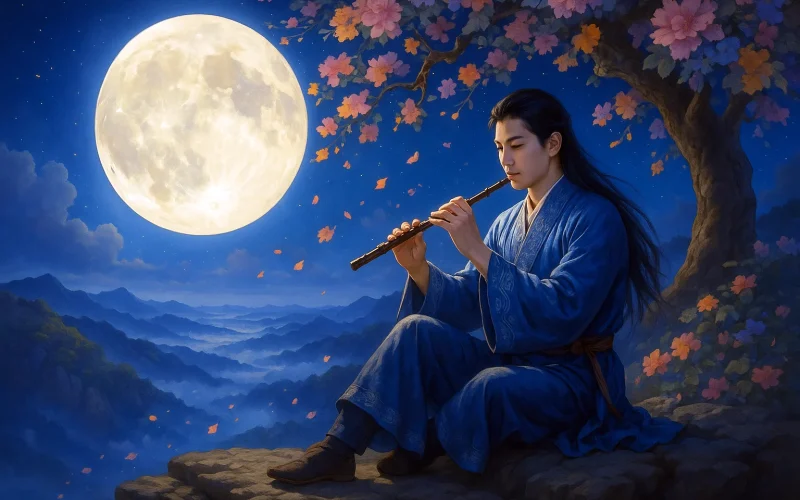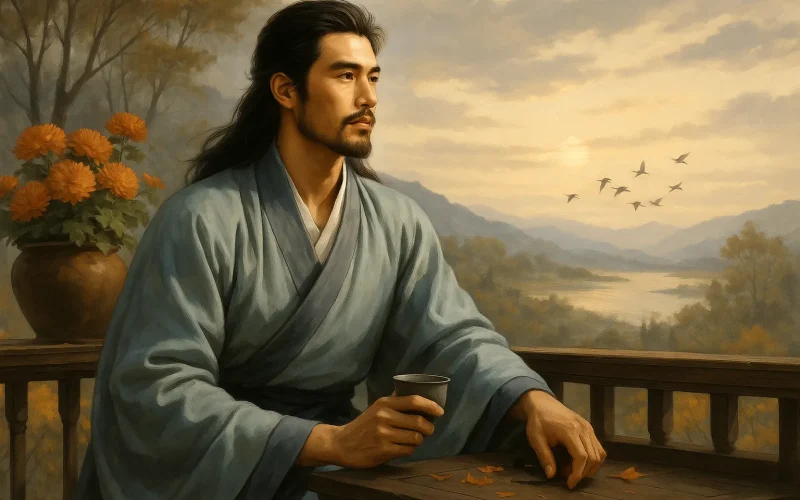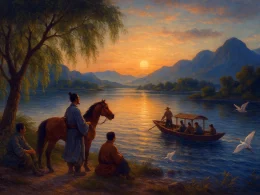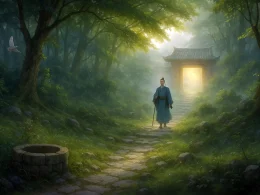Day after day my lone boat drifts beyond sight,
Through endless mist that veils the journey's light.
Hills bend, sails turn—no knowing south from north;
At night, the Dipper guides my vessel forth.
Wild geese descend past cloud-stitched fields in flight,
Frost-touched maples blush on water bright.
How fresh the perch with parsley stewed just right!
From afar I rejoice—autumn's breeze alights.
Original Poem
「初出真州泛大江作」
欧阳修
孤舟日日去无穷,行色苍茫杳霭中。
山浦转帆迷向背,夜江看斗辨西东。
滮田渐下云间鴈,霜日初丹水上枫。
莼菜鲈鱼方有味,远来犹喜及秋风。
Interpretation
Composed in autumn 1045 during Ouyang Xiu's banishment to Zhenzhou following the collapse of the Qingli Reforms, this poetic record of his maiden Yangtze voyage interweaves landscape observation with existential meditation. Through carefully observed natural details, it reveals the Song scholar's characteristic ability to find aesthetic consolation amid political adversity.
First Couplet: "孤舟日日去无穷,行色苍茫杳霭中。"
Day after day the solitary boat drifts without end,
Through boundless mists where all familiar bearings blend.
The opening establishes the journey's temporal and spatial dimensions. The ceaseless drifting ("without end") mirrors the political exile's indefinite nature, while the "boundless mists" symbolize both the physical landscape and the poet's uncertain future. The imagery perfectly captures the disorientation of sudden banishment.
Second Couplet: "山浦转帆迷向背,夜江看斗辨西东。"
At winding river bends, the shifting sails lose their way,
By night, the Dipper's stars my only bearings stay.
The navigational challenges - the confusing river bends and reliance on celestial guidance - become metaphors for the political landscape. The Northern Dipper, a traditional symbol of constancy, highlights what remains reliable when human institutions fail.
Third Couplet: "滮田渐下云间鴈,霜日初丹水上枫。"
Terraced fields recede as wild geese pierce the clouds,
Frost-touched maples blaze where water's mirror shrouds.
This vibrant autumn tableau achieves poignant contrast between the descending fields (human cultivation) and ascending geese (natural freedom). The "frost-touched maples" reflect both seasonal change and political circumstances, their fiery color suggesting undimmed spirit despite adversity.
Fourth Couplet: "莼菜鲈鱼方有味,远来犹喜及秋风。"
Water-shield greens and perch arrive in season -
This exiled traveler still rejoices in autumn's reason.
The concluding couplet transforms the "water-shield and perch"典故 from nostalgia into present-moment appreciation. Where Zhang Han recalled these delicacies to justify resignation, Ouyang finds in them immediate consolation, demonstrating the Song literati's characteristic ability to discover value in displacement. The "autumn's reason" suggests both seasonal cycle and philosophical acceptance.
Holistic Appreciation
This poem captures the poet's thoughts and observations as he departs from Zhenzhou and journeys eastward by boat. It begins with a vast, desolate tone, transitions into a tapestry of vivid scenery, and concludes with a faint yet comforting sense of solace. Through highly visual language, the poet portrays both the uncertainties of travel and the beauty of the autumn river, deftly weaving his personal reflections into the natural landscape. The opening couplets depict the hardships of the voyage, reflecting the bleakness of his exile; the middle couplets paint the autumn scenery like a landscape painting; and the final couplet, drawing on classical allusions, expresses homesickness while affirming the scholar's unwavering commitment to integrity and moral clarity.
Artistic Merits
This poem masterfully blends scenery and emotion, embodying the quintessential Song dynasty landscape poetry style—"feeling within scenery, aspiration within feeling." The language is concise yet evocative, with imagery such as the autumn river, returning geese, frost-touched maples, and water shield and perch (莼鲈) not only creating a vivid late-autumn atmosphere but also symbolizing the poet’s tranquil state of mind and profound emotions. The conclusion, elegantly referencing the "longing for water shield and perch" (莼鲈之思), ties the poem together, revealing the poet’s steadfast literati spirit and magnanimity even in the face of exile and displacement.
Insights
This poem teaches us that even amid life’s uncertainties and hardships, solace can be found in nature’s beauty and life’s simple pleasures. It not only exemplifies the resilience and integrity of Song dynasty scholar-officials but also inspires us to maintain an aesthetic eye and a serene heart during difficult times. As the poet writes: "From afar, I still rejoice in catching the autumn breeze" (远来犹喜及秋风)—no matter how uncertain the road ahead, as long as there is a trace of beauty and flavor to savor, life retains its warmth and meaning.
About the Poet
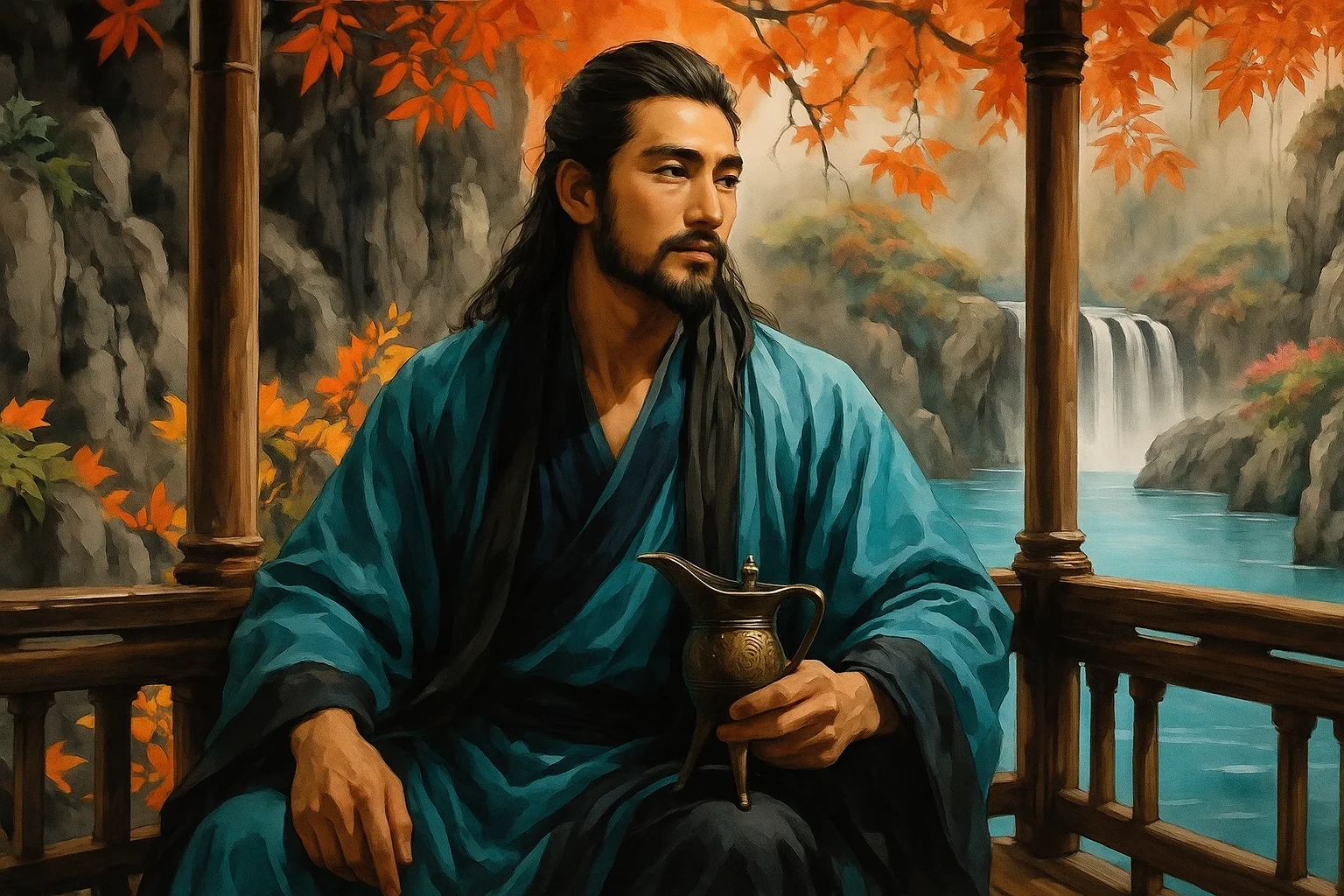
Ouyang Xiu (欧阳修, 1007 - 1072), a native of Yongfeng, Jizhou (present-day Jiangxi Province), emerged as the preeminent literary figure of the Northern Song Dynasty. After attaining the jinshi degree in 1030, he spearheaded a literary reform movement that rejected the ornate Xikun style prevalent at court. As a mentor who nurtured literary giants like Su Shi and Zeng Gong, he laid the foundation for the golden age of Northern Song literature. Recognized as one of the "Eight Great Prose Masters of Tang and Song," Ouyang stands as the pivotal figure in the transformation of Northern Song literary culture.






